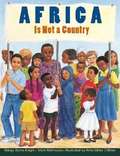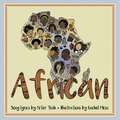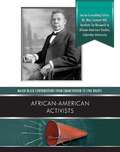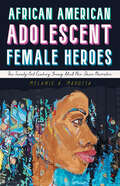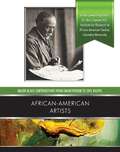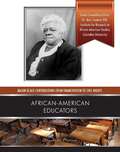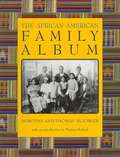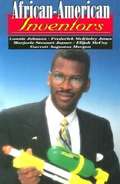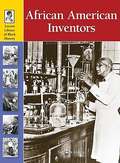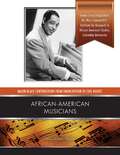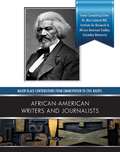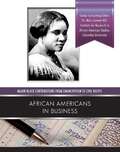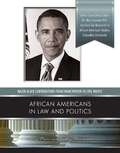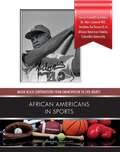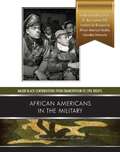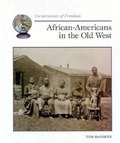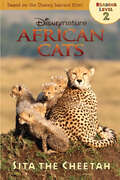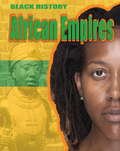- Table View
- List View
Africa for Kids: Exploring a Vibrant Continent - 19 Activities
by Harvey CrozeFor ages 9-12. Africa is brought to life in this imaginative look at the plants, animals, and people that make it such a fascinating continent. Studies of both traditional tribes and modern African cities showcase Africa's diversity, and authentic activities allow kids to dive into the rich culture by making a Maasai bivouac shelter, writing a fable in the African style, working as a field biologist, making a ritual elephant mask, and learning to tie an African Kanga dress. This cross-cultural study also shows kids what challenges Africa faces today while giving them a look at what it is like to live on this interesting continent.
Africa is Not a Country
by Anne Sibley O'BrienEnter into the daily life of children in the many countries of modern Africa. Countering stereotypes, Africa Is Not a Country celebrates the extraordinary diversity of this vibrant continent as experienced by children at home, at school, at work, and at play.
African: A Children's Picture Book (LyricPop #0)
by Peter ToshAn AALBC Recommended New Book! Included in Publishers Weekly's Children's Galleys to Grab at Winter Institute! A beautiful children's picture book featuring the lyrics of Peter Tosh's global classic celebrating children of African descent. So don't care where you come from As long as you're a black man, you're an African No mind your nationality You have got the identity of an African African is a children's book featuring lyrics by Peter Tosh and illustrations by Jamaican artist Rachel Moss. The song "African" by Peter Tosh was originally released in 1977 on his second solo record, Equal Rights. He wrote the song during a time of civil unrest in Jamaica as a reminder to all black people that they were part of the same community. The album is considered one of the most influential reggae works of all time. A key song from the classic 1970s era of reggae Peter Tosh was one of the founding members of the iconic reggae group the Wailers
African American Activists (Major Black Contributions from Emancipat)
by Carol EllisThe Civil War finally ended slavery in the United States in 1865. But blacks didn't suddenly enjoy all the rights other Americans took for granted. They had to struggle against racism and discrimination to claim those rights. African-American Activists traces that generations-long struggle. In this book, you'll meet early activists like Booker T. Washington and W. E. B. Du Bois, who had very different ideas about how blacks should take their place in American society. You'll read about activists who worked for integration and equality under the law during the civil rights movement, including Rosa Parks and John Lewis. And you'll learn how a new generation of African-American activists, such as Majora Carter and Van Jones, continue to work for a better society today.
African American Adolescent Female Heroes: The Twenty-First-Century Young Adult Neo-Slave Narrative (Children's Literature Association Series)
by Melanie A. MarottaIn the wake of the second wave of the Black Lives Matter movement, inequalities and disparities were brought to light across the publishing industry. The need for more diverse, representative young adult literature gained new traction, resulting in an influx of young adult speculative fiction featuring African American young women. While the #BlackGirlMagic movement inspired a wave of positive African American female heroes in young adult fiction, it is still important to acknowledge the history and legacy of enslavement in America and their impact on literature. Many of the depictions of young Black women in contemporary speculative fiction still rely on stereotypical representations rooted in American enslavement.African American Adolescent Female Heroes: The Twenty-First-Century Young Adult Neo-Slave Narrative investigates the application of the neo-slave narrative structure to the twenty-first-century young adult text. Author Melanie A. Marotta examines texts featuring a female, adolescent protagonist of color, including Orleans, Tankborn, The Book of Phoenix, Binti, and The Black God’s Drums, as well as series like the Devil’s Wake series, Octavia E. Butler’s Parable series, and the Dread Nation series. Taken together, these chapters seek to analyze whether the roles for adolescent female characters of color are changing or whether they remain re-creations of traditional slave narrative roles. Further, the chapters explore if trauma, healing, and activism are enacted in this genre.
African American Artists (Major Black Contributions from Emancipat)
by Carol EllisFrom quilts to marble, from comic strips to welded steel, African Americans have created exciting works of art for more than a hundred years. African-American Artists traces the struggles and shows the work of many of these men and women. This book will introduce you to Harriet Powers, who was born a slave and who told legends and stories on her quilts. You'll meet Horace Pippin, who taught himself to paint and kept painting even after he lost the use of his arm. Cartoonist Aaron McGruder and digital artist Angela Perkins are among the African-American artists who continue to enrich the nation's culture today.
African-American Astronauts
by Stanley P. Jones L. Octavia TrippDescribes the lives and accomplishments of five African-American astronauts including Guion S. Bluford Jr., Charles F. Bolden Jr., Frederick D. Gregory, Bernard A. Harris Jr., and Mae C. Jemison.
African-American Aviators
by Stanley P. JonesBriefly describes the lives and accomplishments of five African-American pilots: James Banning, Bessie Coleman, Daniel James, Benjamin Davis, and William Powell.
African American Educators (Major Black Contributions from Emancipat)
by Elizabeth MassieWithout education, it's very difficult to make the most of your talents and abilities. But for much of American history, black people couldn't get an education. In many places it was against the law for slaves to learn to read and write. Despite this, many brave slaves found a way to learn. Some taught themselves. Others sneaked to schools held late at night. Even after slavery was ended in 1865, African Americans continued to be treated unfairly. It was still a struggle for them to get an education. African-American educators stepped up to make a difference. They faced hardship. They often worked for very little pay--or for no pay at all. These educators built schools. They taught their students and stood up for equal rights. They proved that a person's race has nothing to do with his or her ability.
The African American Family Album
by Dorothy Hoobler Thomas HooblerThe African American Family Album is a collection of the memories and experiences of a people who were first Africans, then slaves, and finally African Americans. Unlike most other immigrants to this country, the majority of Africans were brought to America against their will. The first slaves from Africa arrived in the Americas in the 16th century. Over the next 450 years, it is estimated that more than 11 million Africans (some think as many as 40 million) were taken from their homeland in the largest forcible movement of people in history. Torn from Africa, chained and forced to endure the "middle passage" to their new country, destined for a lifetime of slavery--this was the historical beginning of the American experience for most of today's African Americans. But there are cases of Africans who avoided or escaped that fate to becomes explorers and pioneers in the New World. Those fortunate few are also part of The African American Family Album, as are the 4 million African Americans who found themselves newly freed at the end of the Civil War. Their struggles to gain financial independence were thwarted by prejudice and hatred, and the enforced separation of the races. With little political or economic power, many found freedom to be but one step above slavery. The Great Migration between 1910 and 1950 brought millions from the tenant farms and towns of the South to settle in northern cities, one of the greatest population shifts the United States has ever experienced. This migration was one African Americans chose to make themselves. They moved for the same reasons that have brought other immigrant groups to the United States--to escape persecution and injustice and to find a better life. In the process, African Americans brought with them the blues, jazz, and gospel music that were to transform the culture of America. In cities and in the rural areas, in both the North and South, family loyalty, religion, and finally a movement for civil rights that brought purpose and hope to millions became key elements that held the African American family together. In their own words--from interviews, letters, diaries, newspaper articles, and published writings--the story of the African American unfolds in this moving and significant Family Album. Photographs culled from archives, news sources, and family collections make the history that is told here real and immediate. Profiles of Sojourner Turth, Booker T. Washington, W. E. B. Du Bois, Toni Morrison, and other notable African Americans are included, as are the words of such famous figures as Jackie Robinson, Spike Lee, Langston Hughes, Hank Aaron, Ralph Abernathy, and many others less famous who also proudly call themselves African Americans. They bring the story up to date, and reinforce the importance of their African roots to today's African American. Their history is part of our country's story now, and an important component in the great American Family Album. <P><P><i>Advisory: Bookshare has learned that this book offers only partial accessibility. We have kept it in the collection because it is useful for some of our members. Benetech is actively working on projects to improve accessibility issues such as these.</i>
African-American Inventors: Lonnie Johnson, Frederick Mckinley Jones, Marjorie Stewart Joyner, Elijah Mccoy, Garrett Augustus Morgan
by Fred M. B. AmramProvides biographical profiles of five African American inventors including Lonnie Johnson, Frederick McKinley Jones, Marjorie Stewart Joyner, Elijah McCoy, and Garrett Augustus Morgan.
African American Inventors (Lucent Library of Black History)
by Stephen CurrieThis survey of African-American inventors includes some familiar names, but more whose names are less recognizable than their work. The stories of these bright and ambitious individuals are about science, technology, and individual discovery, but also about what it means - and what it has meant - to be black in the United States. Profiles of the most prominent inventors during each era of American history illustrate how blacks were viewed in society, as well as how they perceived themselves and how they functioned as a community through time.
African American Musicians (Major Black Contributions from Emancipat)
by Claudette HegelAfrican Americans--famous and anonymous alike--have helped shape popular musical genres ranging from jazz and blues to rock 'n' roll and rap. This book provides a vivid account of that process, beginning with the work songs and spirituals of slaves and continuing up to the present. African-American Musicians tells the stories of figures such as bluesman Robert Johnson, whose guitar playing was so extraordinary that people said he must have made a deal with the devil; jazz great Duke Ellington, considered one of America's greatest composers and bandleaders; classical singer Marian Anderson, who struck a blow for civil rights with her music; Michael Jackson, the "King of Pop"; and many, many more.
African American Scientists and Inventors (Major Black Contributions from Emancipat)
by Tish DavidsonSome of them were elementary school dropouts. Others became medical doctors or college professors. Some were famous, while some toiled in obscurity. Some became rich. Others remained poor their whole lives. But the African-American scientists and inventors profiled in this book had one thing in common: a determination to succeed. And in pursuing their dreams, these creative thinkers made the world a better place. Lewis Latimer devised a manufacturing process that made electric lights affordable for ordinary people. Charles Drew did pioneering work in blood storage, helping save countless lives. Garrett Woods figured out how to send messages from moving trains. Learn about these and many other black scientists and inventors in this fascinating book.
African American Writers and Journalists (Major Black Contributions from Emancipat)
by Mary Hertz ScarbroughAfrican-American Writers and Journalists spans nearly three centuries of literary and journalistic history, from a long-unpublished ballad composed in the 1740s by a slave named Lucy Terry to the works of the Nobel Prize-winning novelist Toni Morrison. It tells the stories of figures such as Frederick Douglass, whose towering intellect and powerful prose helped animate the movement to abolish slavery; Ida B. Wells and Charlotta Bass, journalists who risked their lives to report on racial violence and injustice; and Ralph Ellison and Richard Wright, who challenged society with hard questions about race and equality.
African Americans in Business (Major Black Contributions from Emancipat)
by Tish DavidsonMany people dream of owning their own business or making it to the top of the corporate ladder. In the pages of this book, you'll meet African Americans who overcame obstacles and stereotypes to make their dreams a reality. Madam C. J. Walker was orphaned at age 7, married at 14, became a mother at 18, and was widowed at 20. She went on make a million dollars selling hair care products. Berry Gordy loved music but went broke after opening a record store. He didn't give up, though. Gordy eventually started Motown Records, which became one of the country's most successful record labels and introduced a host of talented black artists to mainstream American audiences. Stanley O'Neal grew up on a farm without running water or indoor toilets. Through intelligence and hard work he became the head of a $50 billion investment bank. Read about these and other inspiring figures in this book.
African Americans in Law and Politics (Major Black Contributions from Emancipat)
by Mary MainOn November 4, 2008, Americans went to the polls and elected the first black president in the history of the United States. Barack Obama was clearly a gifted politician with impressive achievements and a compelling life story. Still, his historic election wouldn't have been possible if earlier generations of African Americans hadn't paved the way. This book tells the stories of pioneering African-American lawyers and politicians. It details their efforts to guarantee black people the same rights enjoyed by other Americans, including the right to vote. In courtrooms, statehouses, and the halls of Congress, the people profiled in this book have helped make the United States what the framers of the Constitution hoped: "a more perfect Union."
African Americans in Radio, Film, and TV Entertainers (Major Black Contributions from Emancipat)
by Linda J. ArmstrongThis book is filled with fascinating stories, from the night a shy young woman's play changed Broadway to the day the most successful talk show host in history got her start. Find out about the stage actor who once earned letters in four college sports--and who won academic honors, too. Follow the triumphs and disappointments of some of the most famous black entertainers in our nation's history. Rediscover great personalities who have been forgotten. And learn about how the roles of black performers both changed with and helped changed American society.
African Americans in Sports (Major Black Contributions from Emancipat)
by James NasiumThis book profiles some of the greatest African-American athletes of the past 150 years. They competed in sports ranging from boxing and horse racing to track and field, basketball, and baseball. As you'll discover, what these champions accomplished on the field of competition was often but a small part of their story. Read, for example, about how doctors thought Wilma Rudolph might never walk after a childhood bout of polio--but she went on to sprint her way to three Olympic gold medals. Or how the fiery Jackie Robinson silently endured a torrent of abuse in order to break baseball's "color barrier." Find out the connection between a stolen bike and Muhammad Ali's legendary boxing career. And learn how the African-American sports heroes of the past helped pave the way for superstars of the present, such as Kobe Bryant, Tiger Woods, and Candace Parker.
African Americans in the Military (Major Black Contributions from Emancipat)
by Marcia Amidon LustedAfrican Americans have participated in all of the country's major conflicts, from the Revolutionary War to the present. Their contributions were vital and their courage on the battlefield commendable. Often, however, the nation was less than grateful. This book tells the story of blacks in the U.S. military. It is a story of courage and honor--a story that will both fascinate and inspire.
African-Americans in the Old West (Cornerstones of Freedom)
by Tom McgowenDescribes the important role of freed slaves and other African-Americans in the settlement of the Western US.
African Archaeology Without Frontiers: Papers from the 2014 PanAfrican Archaeological Association Congress
by Chapurukha M Kusimba Santores Tchandeu Dirk Seidensticker Adrianne Daggett Marilee Wood Laure Dussubieux Tim Forssman Kate Smuts Nick Wiltshire Akin Ogundiran Matthew Davies Caleb Adebayo Folorunso Timothy Kipkeu Kipruto Freda M’Mbogori Henrietta L Moore Emubosa Orijemie Alex Schoeman Festo W Gabriel Elinaza Mjema Philip de Barros Gabriella Lucidi NarcisseConfronting national, linguistic and disciplinary boundaries, contributors to African Archaeology Without Frontiers argue against artificial limits and divisions created through the study of ‘ages’ that in reality overlap and cannot and should not be understood in isolation. Papers are drawn from the proceedings of the landmark 14th PanAfrican Archaeological Association Congress, held in Johannesburg in 2014, nearly seven decades after the conference planned for 1951 was re-located to Algiers for ideological reasons following the National Party’s rise to power in South Africa. Contributions by keynote speakers Chapurukha Kusimba and Akin Ogundiran encourage African archaeologists to practise an archaeology that collaborates across many related fields of study to enrich our understanding of the past. The nine papers cover a broad geographical sweep by incorporating material on ongoing projects throughout the continent including South Africa, Botswana, Cameroon, Togo, Tanzania, Kenya and Nigeria. Thematically, the papers included in the volume address issues of identity and interaction, and the need to balance cultural heritage management and sustainable development derived from a continent racked by social inequalities and crippling poverty. Edited by three leading archaeologists, the collection covers many aspects of African archaeology, and a range of periods from the earliest hominins to the historical period. It will appeal to specialists and interested amateurs.
African Cats: Sita the Cheetah
by Disney PressInspired by the journey of the cheetahs in the Disney Nature film, African Cats: The Kingdom of Courage.
African: A Children's Picture Book (LyricPop)
by Peter ToshAn AALBC Recommended New Book! Included in Publishers Weekly's Children's Galleys to Grab at Winter Institute! A beautiful children's picture book featuring the lyrics of Peter Tosh's global classic celebrating children of African descent. So don't care where you come from As long as you're a black man, you're an African No mind your nationality You have got the identity of an African African is a children's book featuring lyrics by Peter Tosh and illustrations by Jamaican artist Rachel Moss. The song "African" by Peter Tosh was originally released in 1977 on his second solo record, Equal Rights. He wrote the song during a time of civil unrest in Jamaica as a reminder to all black people that they were part of the same community. The album is considered one of the most influential reggae works of all time. A key song from the classic 1970s era of reggae Peter Tosh was one of the founding members of the iconic reggae group the Wailers
African Empires (Black History #5)
by Dan Lyndon-CohenThe history of the African continent covers thousands of years, thousands of kilometres and millions of peoples speaking hundreds of languages. There are countless stories, dances, poems and songs. They tell the history of the great ancient civilisations, such as the Egyptians; the powerful kingdoms in West Africa of Mali and Songhai; the trading cities of Timbuktu and Gao; and enormous structures, such as the pyramids and Great Zimbabwe. This book looks at the great civilisations of the African continent and the people within these complex societies.The Black History series brings together a wide range of events and experiences from the past to promote knowledge and understanding of black culture today.

